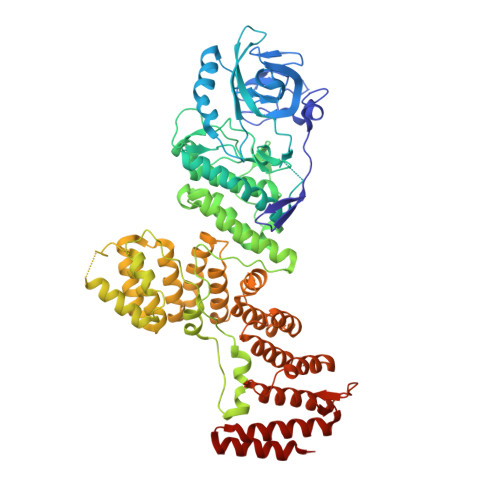Structural basis for the specific inhibition of protein kinase G, a virulence factor of Mycobacterium tuberculosis.
Scherr, N., Honnappa, S., Kunz, G., Mueller, P., Jayachandran, R., Winkler, F., Pieters, J., Steinmetz, M.O.(2007) Proc Natl Acad Sci U S A 104: 12151-12156
- PubMed: 17616581
- DOI: https://doi.org/10.1073/pnas.0702842104
- Primary Citation of Related Structures:
2PZI - PubMed Abstract:
The pathogenicity of mycobacteria such as Mycobacterium tuberculosis is closely associated with their capacity to survive within host macrophages. A crucial virulence factor for intracellular mycobacterial survival is protein kinase G (PknG), a eukaryotic-like serine/threonine protein kinase expressed by pathogenic mycobacteria that blocks the intracellular degradation of mycobacteria in lysosomes. Inhibition of PknG with the highly selective low-molecular-weight inhibitor AX20017 results in mycobacterial transfer to lysosomes and killing of the mycobacteria. Here, we report the 2.4 A x-ray crystal structure of PknG in complex with AX20017. The unique multidomain topology of PknG reveals a central kinase domain that is flanked by N- and C-terminal rubredoxin and tetratrico-peptide repeat domains, respectively. Directed mutagenesis suggests that the rubredoxin domain functions as a regulator of PknG kinase activity. The structure of PknG-AX20017 further reveals that the inhibitor is buried deep within the adenosine-binding site, targeting an active conformation of the kinase domain. Remarkably, although the topology of the kinase domain is reminiscent of eukaryotic kinases, the AX20017-binding pocket is shaped by a unique set of amino acid side chains that are not found in any human kinase. Directed mutagenesis of the unique set of residues resulted in a drastic loss of the compound's inhibitory potency. Our results explain the specific mode of action of AX20017 and demonstrate that virulence factors highly homologous to host molecules can be successfully targeted to block the proliferation of M. tuberculosis.
- Biozentrum, University of Basel, CH-4056 Basel, Switzerland.
Organizational Affiliation:




















